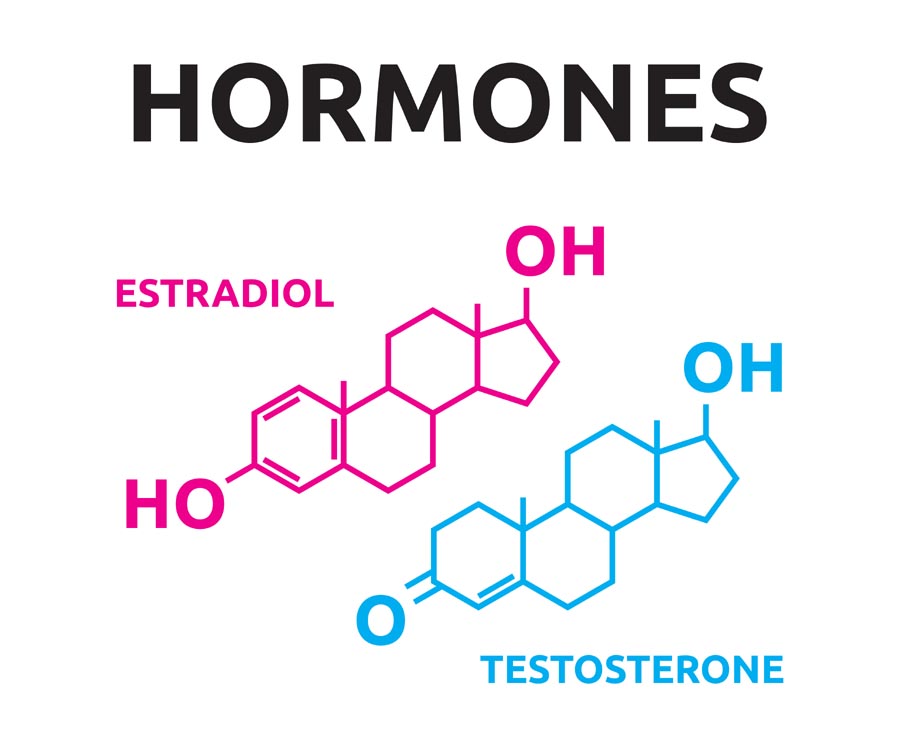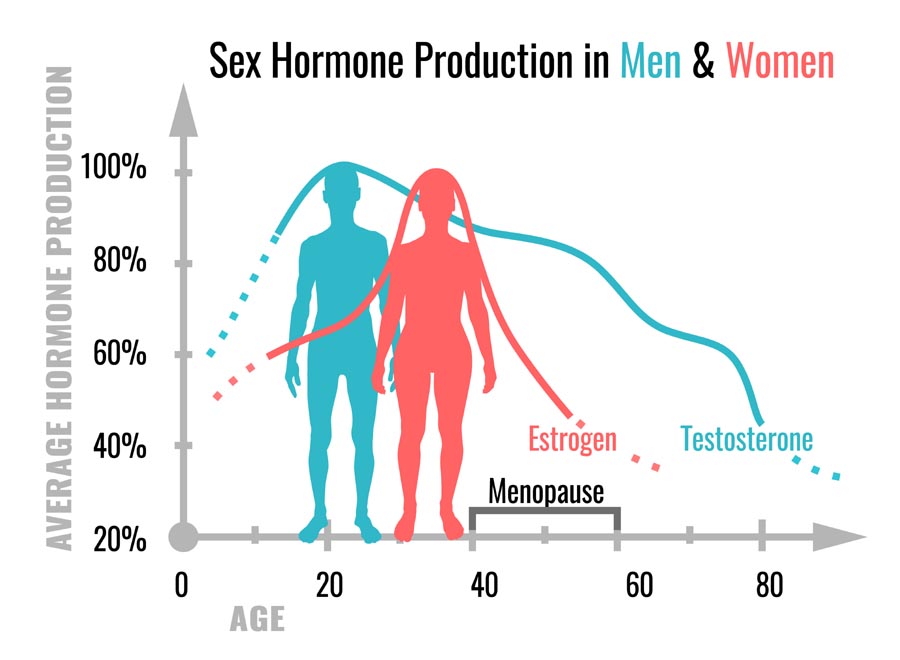FEMALE SEX HORMONES, IMPORTANCE AND TYPES
Definition, Importance, Types- Know All
Hormones, by definition, are
substances which are secreted by a tissue in the body to effect change
in another tissue. Therefore, hormones do not necessarily control women
but are crucial to a woman’s overall health. Understanding how female
sex hormones work is important if you want to understand the female
psychology, predisposition and sexual tendencies.

The main female sex hormone is estrogen. Progesterone is also a crucial female sex hormone. These hormones are produced in the gonads and control the ovulation cycle and maintain a healthy female reproductive system. Other hormones that may fall in this category are Follicle Stimulating Hormone (FSH) and Luteinizing Hormone (LH). These two hormones are not produced in the gonads but by the pituitary gland during puberty. They control the secretion of estrogen and progesterone. They also assist in the preparation of a mature egg to be fertilized by a sperm.

Male and female sex hormones differ in terms of their functions. They do have similarities as they are produced in the gonads. In addition, men have a small amount of estrogen while women have small amounts of testosterone, these two being the main sexual hormones in each sex. Male sex hormones are responsible for masculine characteristics such as facial hair, height, broad shoulders, a high sex drive and a deep voice; manly passions such as sports as well as character traits such as ambition, goal-oriented and competitiveness. Female sex hormones are responsible for physical characteristics in women and character traits such as being nurturing, soft and caring.
Basically, female sex hormones are what make women uniquely feminine while male sex hormones are what make men uniquely masculine.
Hormones are chemical messengers that control various bodily, and, most importantly, sexual functions. Therefore, understanding their functions and how to cope with imbalances is fundamental. The gift of sexual, whether you are male or female, should be preserved and protected not just for our own sake, but for the sake of the entire human race.
What are Female Sex Hormones?
Female sex hormones are the hormones that bring about secondary sexual characteristics in women during puberty. These characteristics include breast enlargement, menstruation, widening of the hips and increased vascularization of the skin. These hormones are normally produced in the female gonads. They control physical and sexual development in women as well as the ovulation cycle.What is the Importance of Female Sex Hormones?
Female sex hormones are of utmost importance in the continuation of the human species in the following ways:- They prepare a woman’s body for fertilization and childbirth by controlling a woman’s ovulation cycle.
- They enhance* a woman’s physical feature by making her more curvy and feminine as these hormones control fat deposition in a woman’s body. This enhancement of physical features is meant to attract suitable mates from the opposite sex.
- These hormones maintain a healthy vagina and uterus (particularly during pregnancy) which is important for the process of mating and reproducing offspring to be successful.
- They maintain pregnancy and enhance* fetal development.
What are the Types of Female Sex Hormones?

The main female sex hormone is estrogen. Progesterone is also a crucial female sex hormone. These hormones are produced in the gonads and control the ovulation cycle and maintain a healthy female reproductive system. Other hormones that may fall in this category are Follicle Stimulating Hormone (FSH) and Luteinizing Hormone (LH). These two hormones are not produced in the gonads but by the pituitary gland during puberty. They control the secretion of estrogen and progesterone. They also assist in the preparation of a mature egg to be fertilized by a sperm.
How to Balance Female Sex Hormones?
Hormonal imbalances can affect a woman’s moods and even her sex drive. Because a woman’s body undergoes various cycles throughout her life, hormonal imbalances are inevitable. However, there are things women can do or certain lifestyles women can adapt to control hormonal imbalances:- Understand how your hormones function in order to control the situation. Do not let your hormones control your life. If you occasionally experience the blues, instead of going with it and being miserable, understand that your hormones could be responsible and find ways to lighten your mood.
- Get blood tests done by a doctor in order to determine your hormonal profile. In this way, supplements will be prescribed for the hormones that you lack.
- Reduce* your stress levels by getting organized, dealing with problems as they come and taking time off to relax. Stress does many negative things to our body and hormonal imbalance is one of them.
- Exercise is good for your overall well being and improves* blood circulation. Hormones are transported through the bloodstream hence exercise will improve* their transportation.
- Get enough rest. Lack of sleep can affect hormone production and lead to hormonal imbalance.
- Limit your caffeine intake as too much caffeine wreaks havoc to the hormone secretion system.
- Eat a balanced diet and limit the intake of food that affects hormonal balance such as soy.
What are the Differences Between Male and Female Sex Hormones?

Male and female sex hormones differ in terms of their functions. They do have similarities as they are produced in the gonads. In addition, men have a small amount of estrogen while women have small amounts of testosterone, these two being the main sexual hormones in each sex. Male sex hormones are responsible for masculine characteristics such as facial hair, height, broad shoulders, a high sex drive and a deep voice; manly passions such as sports as well as character traits such as ambition, goal-oriented and competitiveness. Female sex hormones are responsible for physical characteristics in women and character traits such as being nurturing, soft and caring.
Basically, female sex hormones are what make women uniquely feminine while male sex hormones are what make men uniquely masculine.
How do Female Sex Hormones Affect Sexuality?
Female sex hormone levels primarily control the ovulation cycle. However, unchecked estrogen levels can affect the libido. Estrogen enhances* the effects of another hormone known as oxytocin. Oxytocin or the ‘love hormone’ is produced by the brain during sex when a woman climaxes. It is also produced during physical touch such as hugging to induce the sex drive and trust levels between lovers. In addition, testosterone, which is responsible for a woman’s sex drive, cannot function in the absence of estrogen as estrogen boosts* a woman’s sexual receptivity.What Hormones do the Ovaries Produce?
Estrogen and progesterone are produced in the ovaries. However, once a woman is impregnated, the placenta becomes the main producer of estrogen and progesterone. The ovaries also produce small amounts of testosterone.The Effects of Female Sex Hormones on Cancer Survival
High levels of estrogen are often associated with breast cancer. This is because breast cancer is a hormone sensitive condition whereby a high level of estrogen promotes* the cancerous growths. Nonetheless, this situation can be controlled by lowering estrogen levels by administering progesterone supplements.How to Evaluate Female Sex Hormones?
Female sex hormone levels can be evaluated by getting a hormone profile at the doctor’s office. Hormone evaluation tests involve blood tests and urine sample tests.What is the Treatment for Female Sex Hormones Disorders?
Female sex hormone disorders mostly involve some form of hormonal imbalance. Hormone imbalance is mostly caused by three conditions: Premenstrual Syndrome (PMS), pregnancy and menopause. These conditions are mostly characterized by:- Hot flashes and nausea
- Mood swings
- Vaginal dryness (only during menopause)
- Sleep disorders
- Low libido
- Abdominal cramps and flatulence (PMS)
Hormones are chemical messengers that control various bodily, and, most importantly, sexual functions. Therefore, understanding their functions and how to cope with imbalances is fundamental. The gift of sexual, whether you are male or female, should be preserved and protected not just for our own sake, but for the sake of the entire human race.
Comments
Post a Comment